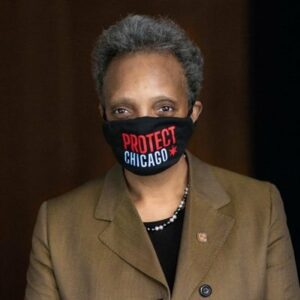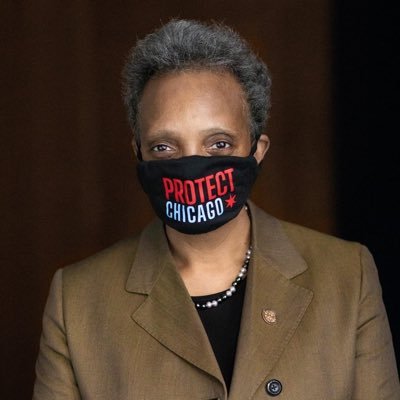
A Democratic mayor in a big, blue city with escalating crime, civil dysfunction, and a crumbling economy lost an election Tuesday night. Can you guess what her excuse for defeat was?
I’m sure you can guess. It was racism and sexism that brought down Chicago’s black, lesbian mayor—who won her initial election with more than 70% of the vote in 2019.
At least, that’s according to soon-to-be-former Mayor Lori Lightfoot.
“I’m a black woman and, let’s not forget, some folks frankly don’t support us in leadership roles,” Lightfoot said in a recent New Yorker interview.
Lightfoot’s loss wasn’t a squeaker. She took just 16.4% of the vote. In fairness, it was a crowded field of candidates, but that typically isn’t a huge hurdle for an incumbent mayor in a city almost entirely controlled by Democrats.
Chicago isn’t exactly MAGA country, unless you believe a certain disgraced former actor.
Particularly embarrassing for Lightfoot is that she came in a distant third in the nine-candidate field. Paul Vallas, a former schools CEO backed by the police union, and Brandon Johnson, a Cook County commissioner endorsed by the Chicago Teachers Union, will face off in the April 4 runoff election, since neither reached the required 50%-plus of the vote.
Unsurprisingly, the focus of the election was rising crime, which has gone from bad to intolerable in large swaths of the city. More on that later.
We’re supposed to think that after Lightfoot’s overwhelming win in 2019, Chicago voters suddenly decided they couldn’t stand having a black woman as a mayor. Sure.
But Lightfoot didn’t actually seem to have much of a problem with racism.
In 2021, she announced that she wouldn’t do one-on-one interviews with white reporters.
“I ran to break up the status quo that was failing so many,” Lightfoot said in a letter to City Hall reporters. “That isn’t just in City Hall. It’s a shame that in 2021, the City Hall press corps is overwhelmingly white in a city where more than half of the city identifies as black, Latino, [Asian American/Pacific Islanders] or Native American.”
Not only was this policy bigoted in the name of wokeness, it was almost certainly illegal. She backed off the policy after being sued, but was generally unrepentant.
“I’m unapologetic about it because it spurred a very important conversation, a conversation that needed to happen, that should have happened a long time ago,” she said.
Lightfoot is someone who has climbed her way to the top in large part by leaning into her identity. Her grousing about voters being prejudiced against her is really a cope for the fact that her identity couldn’t save her from her own failures, incompetence, and imperious rule.
Lightfoot was one of the mayors who demanded her city defund the police in the wake of the killing of George Floyd in Minneapolis in May 2020. After riots rocked her city and violent crime shot through the roof, she begged the federal government to come in and help fix the problem.
Increases in violent crime became a national phenomenon in the wake of the “defund the police” movement and riots of 2020. But Chicago, which already had escalating violent crime in the past decade, got hit particularly hard.
“Under Lightfoot’s watch, there were more than 800 murders in the Windy City in 2021—the most in a quarter-century,” The New York Post reported. “The homicide rate dropped 14% last year, but the total of 695 killings was still nearly 40% higher than it was in 2019, when Lightfoot took office.”
So, while parts of Chicago suffered homicide rates higher than Tijuana, Mexico, the city with the highest murder rate in the world, Lightfoot made sure to focus on the real problem in her city—people who refused to get COVID-19 vaccines.
“To put it simply, if you have been living vaccine-free, your time is up. If you wish to live life [with the] ease to do the things you love, you must be vax’d,” Lightfoot wrote on Twitter in 2021, when proof of vaccination was required in indoor spaces. “This health order may pose an inconvenience to the unvaccinated, and in fact it is inconvenient by design.”
This order will remain in effect until the City deems that the threat of COVID-19 to public health has diminished significantly.
— Mayor Lori E. Lightfoot (@chicagosmayor) December 21, 2021
Now, there are some who write off Lightfoot’s problems on forces beyond her control. After all, crime has hit many cities in the U.S. in the past few years, as have business failures as a result of COVID-19 lockdowns. But doesn’t it say something that those cities are mostly controlled by Democrats with a similar ideology?
Maybe, just maybe, our cities don’t have to be crime-ridden. Maybe the dysfunction is due to specific policy choices made by too many out-of-touch leaders like Lightfoot.
Things might not change much in Chicago after Lightfoot’s defeat. After all, leftist ideology still predominates among the city’s leaders. Nevertheless, her defeat shows that there is in fact a limit to voters’ patience.
Jarrett Stepman is a columnist for The Daily Signal. Original here. Reproduced with permission.
A true revival in Chicago will require not only replacing a failed mayor, but a pivot away from the ideology and identity politics that led her to failure.
